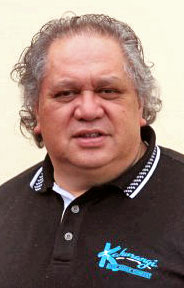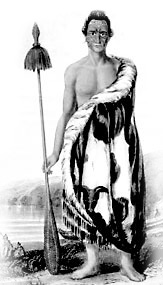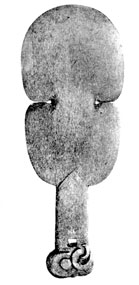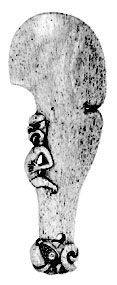An old proverb
This song enlarges on a whakataukī of Tama Huata's
family.
"E rere te huata hopukia, e rere te
manuka tomokia."
When the huata spear comes flying at
you, grasp it;
when the manuka fighting stick is swung, get inside
its arc.”
Grasp the opportunity of the moment; be audacious and
bold in using your opponents' assets to defend those
that you love.
The huata was a spear 6 metres or more in length,
used principally in the defence of hill forts. The name
was bestowed on Tamihana Huata (1820-1908) by his father
Whakaaha. Once, when fighting in a battle, Whakaaha
spied a huata flying towards him, and with a reflex
action caught in it one hand and then hurled it back at
the enemy. His skill and quick-wittedness was
immortalized in the name he gave to his son, and the
family keep the saying to this day. (Spence)
Whangai
Whāngai is a customary Māori practice whereby a
child is brought up by someone other than their birth
parents – usually another relative.
Whāngai may be temporary or permanent. A parent who
takes on a child is called a matua whāngai, and the
child is a tamaiti whāngai.
In the Pakeha custom of adoption, the identity of the
birth parents is kept secret from the growing child. But
the whangaied child knows both its birth parents and
whāngai parents, and parents often gave up children to
comply with the custom.
Reasons for whāngai include:
- an orphaned child
- a large family was struggling to support all the
children
- a child of very young parents
- an illegitimate child
- a child for people who cannot have children
- a child for older people whose children have
grown up
- strengthening kinship
ties by placing children in different families.
- taking in a grandchild to pass down tribal
traditions and knowledge
- taking children in so that they can inherit land.
Well-known whāngai parents include:
- Princess Te Puea Hērangi. She had around 50
whāngai children
- Sir James Henare. He had six natural children and
five whāngai children.
Well-known whāngai children include:
- Wiremu Rātana, founder of the Rātana Church
- Inia te Wiata, opera singer
- Robert Mahuta, land compensation negotiator
- Billy T. James, much-loved comedian
- Wira Gardiner, a senior public servant
- Joline Henry, Silver Ferns netballer.
Tama Huata
 Tama
Huata, MBA, ONZM, (Ngati Kahungunu, Ngati Porou) is the
son of Canon Wi Huata and Ybel Tomoana. Born in 1950, He
is a leader in the renaissance of Maori performing arts.
Tama
Huata, MBA, ONZM, (Ngati Kahungunu, Ngati Porou) is the
son of Canon Wi Huata and Ybel Tomoana. Born in 1950, He
is a leader in the renaissance of Maori performing arts.
In 1968 he began working in Australia, first in
nightclub bands and later in television, eventually
becoming production manager for live musical events on
TV.
At the same time he was a driving force behind efforts
to establish a marae in Sydney, organising several
Sydney Maori Festivals as fundraisers .
These experiences enabled him to work out a strategy
for developing people's talents. On his return to
Heretaunga in 1983, he applied this strategy to the
benefit of the young people of Hastings.
|
"I joined the Kahurangi performing arts
straight out of high school, and with tutors
like Tama Huata, they brought out of each
individual, skills they didn't even
know they had.
I believe that, if it wasn't for the days
that I spent doing performances with them, I
would have turned out very different to the
person I am today." - Thomas Henare
|
With the help of his younger sister Heke and others, he
created a Takitimu Trust, Te Wānanga Whare Tāpere o
Tākitimu, as a training programme for delinquent youth,
with cultural and educational activities that would give
them employment opportunities.
It was so sucessful that by the mid 1980s trainees were
being referred to the Trust from all sorts of agencies.
These were the people whom 'the system' had been unable
to deal with, and branded unemployable.
Adopting the principle of Matua Whangai - looking after
our own - and combining it with a strong
professionalism, Tama formed the Takitimu Performing
Arts School and the Kahurangi Maori Dance Theatre.
In 1994 he was awarded a Fulbright Scholarship to study
dance theatre at the University of Wisconsin, and in
2005 he was a visiting fellow at Trent Univerity,
Toronto. He is currently (in 2012) CEO and senior tutor
at Te
Wananga Whare Tapere O Takitimu.
Kahurangi
Tama founded Kahurangi,
a performing arts group made up of graduates from the
School,as a touring group that showcased Maori culture in
a dynamic modern way that appealed to audiences accustomed
to television glitter and synthetic music.
By 1989 Kahurangi was strong enough to have its own
production and admin staff. It is now New Zealand's
second largest company of dancers after the
government-funded NZ Ballet, and the only professional
Maori one. The touring groups travel extensively
throughout the world, doing over a thousand shows a year
at festivals, schools and embassies.
"Matua Whangai" on record
1989, Magically Maori, Kahurangi
Dance and Theatre Group, CD
Webpage
put onto folksong.org.nz website July 2012,
Our thanks to Te Otinga Hohaia for corrections Feb
2024




 Tama
Huata, MBA, ONZM, (Ngati Kahungunu, Ngati Porou) is the
son of Canon Wi Huata and Ybel Tomoana. Born in 1950, He
is a leader in the renaissance of Maori performing arts.
Tama
Huata, MBA, ONZM, (Ngati Kahungunu, Ngati Porou) is the
son of Canon Wi Huata and Ybel Tomoana. Born in 1950, He
is a leader in the renaissance of Maori performing arts.